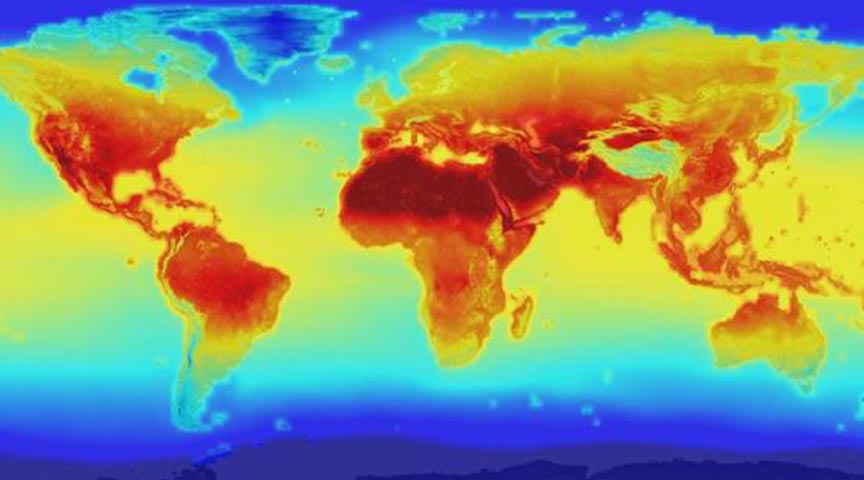It's so depressing sometimes, living in the Greatest City in North America and realizing that we have the worst pension system in the country:
The city of Chicago is the local government most burdened by unfunded retirement plans in the nation, with a pension debt that's more than eight times annual revenues, according to a new study by Moody's Investors Service.
The city's unfunded pension obligations total $29.80 billion, based on a three-year average calculated by Moody's. That is 15.9 percent of its property tax base, making it the highest in the nation by that measure as well, according to the report, which tracks the 50 largest local governments based on outstanding debt.
On the other hand, climate change is making Chicago a little more pleasant, even without the record El Niño forming in the Pacific right now. Crime is down, green space is up, and the lake is clean. It's really a great time to live here.
We are going to have to pay those pensions, though.
Crain's Chicago Business has done a yeoman's job investigating the Illinois pensions crisis. Today's installment digs into how it happened:
A dense, 78-page bill aimed in part at curbing pension abuses in downstate and suburban school systems landed in lawmakers' laps two days before their scheduled May adjournment [in 2005]. One sponsor called it the first “meaningful” reform in 40 years, a reversal of “decades of neglect and bad decisions.” Another predicted that it could save the state up to $35 billion.
But in addition to true reform, the bill later signed by Gov. Rod Blagojevich allowed the state to skip half its pension payments for two years and to stretch out some expenses approved under the previous governor, George Ryan. No one mentioned those could cost $6.8 billion. The math hadn't been done.
Cumulatively, those poor decisions more than quintupled the $20 billion deficit that existed in 1995 to the current $104.6 billion, leaving a seemingly insurmountable emergency with no fix in sight.
Most charitably, the reason Illinois faces such an unholy mess may be the inability of state leaders to fathom how even slight alterations to state employee retirement plans could carry billion-dollar costs or lead to bond-rating downgrades.
Crain's has a definite point of view, and while I'm not sure I completely agree with it, they show how the bad decisions weren't confined to any party or clique. Illinois politicians of both parties showed crashing (or willful) ignorance of basic financial math for so long that it's impossible to hold any of them truly accountable. Maybe that was the plan all along.
Illinois isn't going to drop off the map, nor is Chicago going to disappear like other major industrial cities east of us have done. But we're certainly heading towards ugly negotiations with state retirees and with taxpayers. I just hope that as taxes increase to pay for our past sins, the benefits of living in a vibrant and connected urban space outweigh the increasing costs.
Something has to give, and soon. Maybe our pensions crisis will push us into electing more responsible officials. I'm not optimistic in the short run.
New Zealand is voting over the next year to replace its national flag:
It’s not everyday that a nation chooses a new flag by its own volition, with the support of the voters, without any drastic regime changes. New Zealand is doing exactly that. With the Flag Consideration Project, the Kiwis are trying on a new look.
In an open letter to the peoples of New Zealand, the panel for the Flag Consideration Project introduced 40 finalist designs for an all-new flag. Voters will decide what happens next in two referendums: one in November–December, and another in March 2016.
Here are a couple of the finalists:



Traveling to San Francisco and London as often as I do underscores to me how crappy some things are in Chicago. Take our ridiculous transit fare systems. Metra, the heavy-rail system, still uses little paper tickets, while Ventra only works on CTA buses and trains. I want one card that would let me tap in and tap out of any public transit service in the city.
Citylab says this may be coming soon, at least to some cities:
Unified mobile ticketing means riders no longer need to worry about having the right change for the bus, or having time to buy a train ticket at the station after hitting a major traffic jam. And there’s seamless transitioning between modes of transit. But the digitization creates a lot of savings for the transit agencies themselves.
Then there’s the data. When transit operators have a massive live stream of data on how many people are buying tickets, where they are, where they’re headed, it allows for much more responsive management. They can tweak bus routes based on how the customers actually buy bus tickets and ride. Granted, this approach can’t truly transform American cities until everyone has access to the critical technology.
Given the speed of technological change in Chicago, we can probably expect this in the mid-2040s.
While eating lunch, I read this cheerful article from Rolling Stone:
Thanks to the pressure we're putting on the planet's ecosystem — warming, acidification and good old-fashioned pollution — the oceans are set up for several decades of rapid change. Here's what could happen next.
The combination of excessive nutrients from agricultural runoff, abnormal wind patterns and the warming oceans is already creating seasonal dead zones in coastal regions when algae blooms suck up most of the available oxygen. ...
These low-oxygen regions could gradually expand in size — potentially thousands of miles across — which would force fish, whales, pretty much everything upward. If this were to occur, large sections of the temperate deep oceans would suffer should the oxygen-free layer grow so pronounced that it stratifies, pushing surface ocean warming into overdrive and hindering upwelling of cooler, nutrient-rich deeper water.
Enhanced evaporation from the warmer oceans will create heavier downpours, perhaps destabilizing the root systems of forests, and accelerated runoff will pour more excess nutrients into coastal areas, further enhancing dead zones. ...
Evidence for the above scenario comes in large part from our best understanding of what happened 250 million years ago, during the "Great Dying," when more than 90 percent of all oceanic species perished after a pulse of carbon dioxide and methane from land-based sources began a period of profound climate change. The conditions that triggered "Great Dying" took hundreds of thousands of years to develop. But humans have been emitting carbon dioxide at a much quicker rate, so the current mass extinction only took 100 years or so to kick-start.
Good thing we don't eat plankton, because there won't be much left in a few decades.
Oh, wait...
The ink on the Iranian nuclear deal isn't dry yet, but already American and European companies are starting to benefit:
Iran plans to buy as many as 90 planes per year from Boeing and Airbus to revamp its antiquated fleet once Western sanctions are lifted, its state news agency IRNA quoted a senior aviation official as saying on Sunday.
"Iran will buy a total of 80-90 planes per year from the two aviation giants in the first phase of renovating its air fleet," said Mohammad Khodakarami, the caretaker director of Iran's Civil Aviation Organization, according to IRNA.
"We will purchase planes from Boeing and Airbus in equal numbers," Khodakarami was quoted as saying, adding that Iran would initially need to add at least 80 planes to its fleet each year. That would mean a total of 300 planes within five years, he added.
So over the next five years, the U.S. and Europe will get a small ($2 billion) bump in GDP. And Iran will have flyable civilian airplanes again, but no atomic bombs. Everyone wins!
Just some of the news stories I haven't got time to read this morning:
I will now continue doing tasks from two jobs ago while I think about things I'd like to do for my current job.
So far Chicago has had a milder-than-normal summer, with only a couple of over-32°C days and a lot of rain. Given our greenhouse gas emissions, that will change:
The NASA climate projections offer a detailed view of future temperature and precipitation patterns around the world at a 15.5 mile (25 kilometer) resolution, covering the time period from 1950 to 2100. The 11-terabyte dataset provided daily records and estimates of maximum and minimum temperatures and precipitation over the entire globe. It integrates actual measurements from around the world with data from climate simulations created by the international Fifth Coupled Model Intercomparison Project, or CMIP, which is a standard experimental protocol for studying the output of coupled atmosphere-ocean general circulation models.
The result? Pretty warm:

I won't be around to experience an average annual temperature around 30°C. Unfortunately, given the effects of climate change on our food and water supplies, not many others might be either.
Stuff I found on the Interwebs this week:
That's all for now.
The Atlantic's CityLab blog looks at the historic buildings and shares a 1965 video about its construction:
The city has granted Marina City preliminary landmark status. Final approval could take a few weeks.